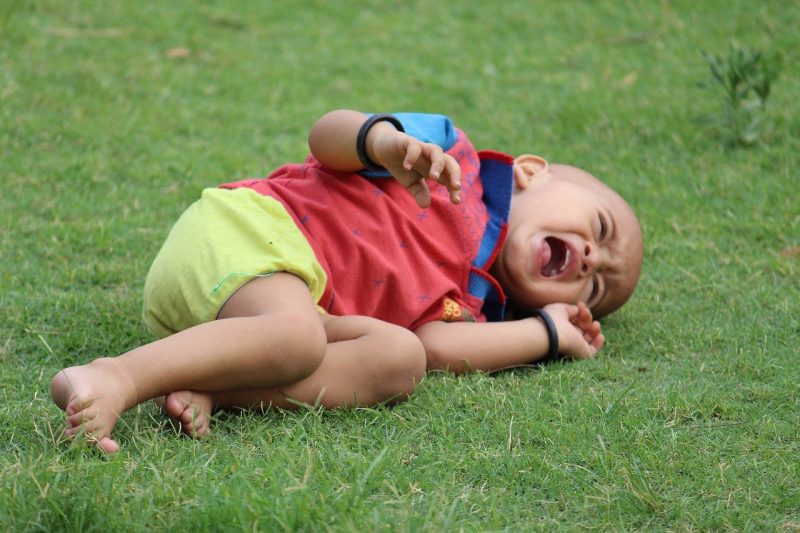







Biting is a more common behavior than most parents realize. I used to work in a daycare and was a teacher in the toddler room. We had a few children that would bite other children, which led to many different courses of action.
There were things that we tried with the children to lessen the biting, and there were procedures to follow when a child was bitten.
My children also went to daycare at a young age, and we discovered then that biting was a common problem as well. If you’re concerned about whether your child can be kicked out of daycare for biting, it’s important to look at the entire situation.
In this article
At this age, most children either bite another kid once or twice, or they are the ones that get bitten. If your toddler is the one doing the biting, it’s important to determine why before biting becomes a problem in daycare.
There are several common reasons that children bite at daycare.
We used to have one child, whom we’ll call Brian, that would bite other children daily. He was not teething, could communicate wonderfully, and was generally a wonderful toddler to have in the class.

View in gallery
He was even potty trained early. However, when he was playing in a group of children, he would inevitably bite one of them. It was a matter of minutes before we would hear a wail when he was in a group. This was the only time he would bite children.
Upon observing the group carefully in an effort to jump in before he bit someone, we discovered that no one was being aggressive towards Brian.
The only trigger was being in a larger group of children. It turned out, this gave him anxiety. Biting was a symptom of that. He needed smaller breaks away from large groups. If children are biting due to anxiety, these things can help:
Teething makes children bite everything, including other children. This is a common reason for children biting at daycare.
If your little one is getting their two-year molars in, or they haven’t come in yet, this could be why you have a two or three-year-old biting at daycare.
Teething can also cause irritability in children because they’re in pain. This can make them more aggressive than they would normally be, which can also contribute to biting at daycare.
To help prevent children from biting at daycare due to teething, try some of these options:
When your little one has something else to bite while at daycare, this lessons the chance that they will bite other children.
Prices pulled from the Amazon Product Advertising API on:
Product prices and availability are accurate as of the date/time indicated and are subject to change. Any price and availability information displayed on [relevant Amazon Site(s), as applicable] at the time of purchase will apply to the purchase of this product.
Some toddlers view another child taking their toys or pushing them as them being aggressive, and they want to defend themselves. This ultimately results in them biting other children.
If your child is biting to defend themselves, it can be helpful to encourage positive behavior, such as telling the teacher. Daycare teachers can also try to prevent biting before it happens in this situation.
Toddlers cannot communicate as well as themselves and don’t have the same coping skills that older people do. Instead, they find other ways to release their emotions.
This can involve biting. A toddler may be irritated, annoyed, tired, hungry, or thirsty and bite other children to express that.
Once most children start talking more, they quit biting if this is the cause. Some daycares and parents opt to teach their children sign language at an early age so that they can communicate before they are able to speak. This works wonderfully.
Prices pulled from the Amazon Product Advertising API on:
Product prices and availability are accurate as of the date/time indicated and are subject to change. Any price and availability information displayed on [relevant Amazon Site(s), as applicable] at the time of purchase will apply to the purchase of this product.
When children do something and it gets an interesting reaction, they’re more likely to do it again. For example, a teacher might be surprised at the first bite, upset, or the other children might be scared.
This is an interesting reaction to a two-year-old biting at daycare, and it actually makes them more likely to bite again. Instead, do not express emotions when addressing the issue, or make a big deal out of biting.
When adults do this, they can accidentally reinforce the negative behavior.
A child that hurts another one is obviously going to be the center of attention for a little bit. If a child wants attention, even negative attention can be a good thing for them.
Do not ignore a toddler biting at daycare, but don’t reinforce it with a lot of attention either. Quick removal from the situation with a “no biting” will usually suffice. This can slowly work to eliminate the behavior if it is for attention.
Sometimes, biting is a normal part of toddler development. Unfortunately, there are only so many things that can be done about this.
Teething toys and other things can help, but this method is also not foolproof. Continue with reinforcing positive behaviors and teething toys to bite on to help slowly eliminate the problem.

View in gallery
While biting is a normal stage that many children go through, it can still become a problem. Some children get kicked out of daycare for this. It’s often due to other behavior issues or the possible legal issues a daycare can face.
Other times, it might simply be because of the daycare policy. If your child is at risk of being kicked out of daycare, it’s important to know the full situation to determine which way you and your little one are headed.
Yes, they can. A daycare can recommend that a child no longer attend or flat out refuse to accept them at the daycare center any longer. Often, daycares will give parents a notice so that they have time to find adequate child care.
In most states, when a daycare has to administer first aid to a child, they’re required to report the incident to both the parent and to the licensing agency.
If bites continue and continue to require first aid, the daycare provider can be in big trouble because it puts the safety of the other children at risk. In this situation, their hands are tied, and they almost have to kick out a child for biting.
Because of the rules and regulations mentioned above, many daycares have established policies regarding biting. Some state that a child biting at daycare will be expelled from daycare after so many incidents.
Others might give time for improvement before resorting to this. What the policy often depends on is the daycare itself.
If one of your major concerns is your three-year-old biting at daycare, take the time to learn the daycare policy regarding the behavior.
If your child biting at daycare is becoming a problem, the daycare may discuss this with you anyway. Here is a forum with examples of what daycares have considered, just to give you an idea. It is an older forum, but still a great resource.
There are times that daycares can get in trouble due to one child biting another. This can be considered a breach of duty because they’re required to give every child reasonable care, and it can be a safety issue when one child bites another one.
Daycares can face liability lawsuits because of this. This is why many daycares have formed stricter policies regarding biting behavior.
If your child is the one biting at daycare, it’s obviously a reason for concern. If a teacher has already had a discussion with you about this behavior, it’s because the behavior is a problem.

View in gallery
There are a few things that you’ll need to be proactive about to make sure that you don’t wind up without childcare.
If you haven’t already done so, familiarize yourself with the daycare policy. Read the fine print. Determine if there’s a section regarding biting, and make sure to double-check with teachers.
You don’t want to wind up in a jam because your little one got kicked out of daycare for biting and you didn’t know that was going to happen.